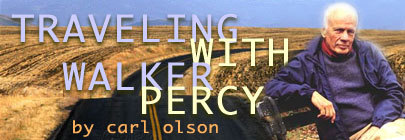Traveling with Walker Percy

Traveling with Walker Percy | Carl E. Olson | The Dispatch at CWR
More than a novelist, Walker Percy was a fellow wayfarer and seeker, as well as a self-described "diagnostician" of the "modern malaise" and a builder of signposts in a strange land.
[Editor's note: This essay, originally posted on Ignatius Insight in November 2004, is posted here on the 100th anniversary of the birth of Walker Percy.]
In the summer of 1995, my wife and I––both Evangelical Protestants at the time–-took a trip with the Catholic novelist Walker Percy.
He had died in 1990, but his presence was very much evident in Signposts In A Strange Land (Noonday Press, 1991, 1992), a posthumous collection of essays and interviews we took along with us and read to one another as we drove from the Pacific Northwest up into Canada on a weeklong vacation.
The title was fitting––not because of the scenery along the highways, but because at the time we found ourselves in a strange land between the familiar, but frustrating, homeland of Evangelical Protestantism and the largely unknown vistas of Catholicism. While others, including Pope John Paul II, St. Thomas Aquinas, St. Theresa of Avila, and G. K. Chesterton, would escort us into the Catholic Church a couple years later, the melancholy and brilliant novelist from the Deep South journeyed with us for an important stretch of that pilgrim’s road.
More than a novelist, Walker Percy was a fellow wayfarer and seeker, as well as a self-described "diagnostician" of the "modern malaise" and a builder of signposts in a strange land.
Out of the Shadows of Southern Tragedy
Born in Georgia in 1916, Walker Percy was shadowed by tragedy from the beginning of his life. His paternal grandfather committed suicide with a shotgun in 1917. Percy’s father, a highly intelligent and successful lawyer who was prone to deep depression, killed himself in the same manner in 1929, just as Percy was entering his teens. Percy later addressed his father’s suicide, at least indirectly, in his second novel, The Last Gentleman (1966). Unbelievably, two years after his father’s suicide, Percy’s mother drowned when her car ran off a bridge not far from their home.
Walker and his brothers were taken in and adopted by their enigmatic and well-educated "Uncle Will," their father’s cousin, and a lawyer and author. Walker loved Uncle Will dearly and gave him credit for changing his life. In Pilgrim in the Ruins, his biography of Percy, biographer Jay Tolson notes, "If it hadn’t been for Uncle Will, Walker Percy once said, he probably would have ended up a car dealer in Athens, Georgia." Uncle Will was a Southern gentleman who held to a Stoic idealism and a Romantic view of the Old South. Though deeply affected by Will’s beliefs, the shy and studious Walker soon embraced a cynical agnosticism and the conviction that modern science held the answers to man’s origins and future. Spurning the life of the lawyer –– a profession highly esteemed in the Percy clan –– Walker chose to pursue a career in medicine. After completing undergraduate work at the University of North Carolina, he went on to Columbia to pursue studies in pathology.
From Doubt to Faith to the "Diagnostic Novel"
An anonymous corpse carrying tuberculosis changed Percy’s life forever. Attending medical school at Columbia, Percy contracted the disease while performing autopsies. Bedridden for three years, he was exhausted and often depressed. Yet later in life he admitted that despite the difficult ordeal he was secretly relieved at being able to leave medicine behind. During his lengthy rehabilitation Percy spent much time reading works of the existentialists Camus, Sartre, and Kierkegaard, as well as the writings of Catholic thinkers Blaise Pascal, Romano Guardini, and St. Thomas Aquinas. An insightful observer of human nature and relationships, Percy had growing doubts about his scientific, materialist view of reality. Years later he wrote,
Carl E. Olson's Blog
- Carl E. Olson's profile
- 20 followers



